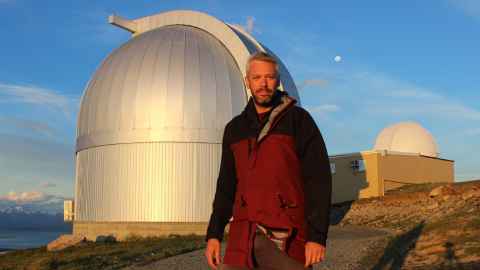Take 10 with... Nicholas Rattenbury
Dr Nicholas Rattenbury from the Department of Physics gives us 10 minutes of his time to discuss extra-solar planets, galactic structure and time domain astrophysics.

1. Describe your research topic to us in 10 words or less.
I discover alien worlds!
2. Now explain it in everyday terms!
Everything in our Galaxy is moving. Occasionally a star passes between us here on Earth and a background star. When this happens, the light from the background star gets bent by the gravity of the star between us and it, in a manner very similar to light being bent by a magnifying glass. By looking carefully at how the light from the background star appears to be affected by the gravity of the foreground object, we can detect any planets going around the foreground star.
3. Describe some of your day-to-day research activities.
I usually start the day by emailing my colleagues across the world and in New Zealand. Often I am asked to supply some information about the projects in which I'm involved, or to help out someone trying to solve a problem in the same field. I also write to others asking them to help me out, by providing data or some explanation of their published work that I can't figure out. I'm regularly on video conferences with my colleagues discussing how to prepare grant applications or how to present research results.
Once I feel I'm on top of the communication side of things, I write, adapt, run and debug computer code that model the planetary systems I am analysing. Right now I'm working on a new methodology to speed up discovering faint planetary signals in the data we are going to get from a new space telescope that will launch in the mid-2020s.
4. What do you enjoy most about your research?
I particularly like learning a new method or application that I haven't come across before, but shows promise for attacking a problem in a new way. I also enjoy travelling to meet with colleagues with whom I work and collaborate.
5. Tell us something that has surprised you in the course of your research.
The extent to which being a good communicator is essential for developing fruitful relationships in science.
6. How have you approached any challenges you’ve faced in your research?
A determination to keep attacking the problem and not being afraid to ask others for help and advice. Quite often this means swallowing my pride and admitting that I can't be an expert in every aspect of the work and there is no shame in approaching others for assistance. In general, working with a wide range of people on a shared problem quite often forces you to challenge your assumptions. This in itself is a powerful means for pushing ahead in new and interesting ways.
7. What questions have emerged as a result?
I am becoming more interested in the opportunities that machine learning and artificial intelligence provide for the start of an era of computer/human co-discovery. As we create experiments that generate ever larger and richer datasets, we will have to guide our computer codes to make discoveries without human intervention.
8. What kind of impact do you hope your research will have?
I hope to help expand our knowledge of the sort of extra-solar planetary systems are out there, and refine our understanding of the requirements for alien life in the Universe.
9. If you collaborate across the faculty or University, who do you work with and how does it benefit your research?
I work mainly with Dr John Cater, Jim Hefkey (Faculty of Engineering); Prof Jari Kaipio, Dr Matthew Egbert, Dr Patrice Delmas, Dr Dion O'Neale and Dr JJ Eldridge (Faculty of Science); and Prof. Kathy Campbell (School of Environment). In most cases we have shared research projects and in all cases, they are excellent people to talk to about research.
10. What one piece of advice would you give your younger, less experienced research selves?
Never be afraid to seek out expert help from your colleagues around you, or indeed further afield.